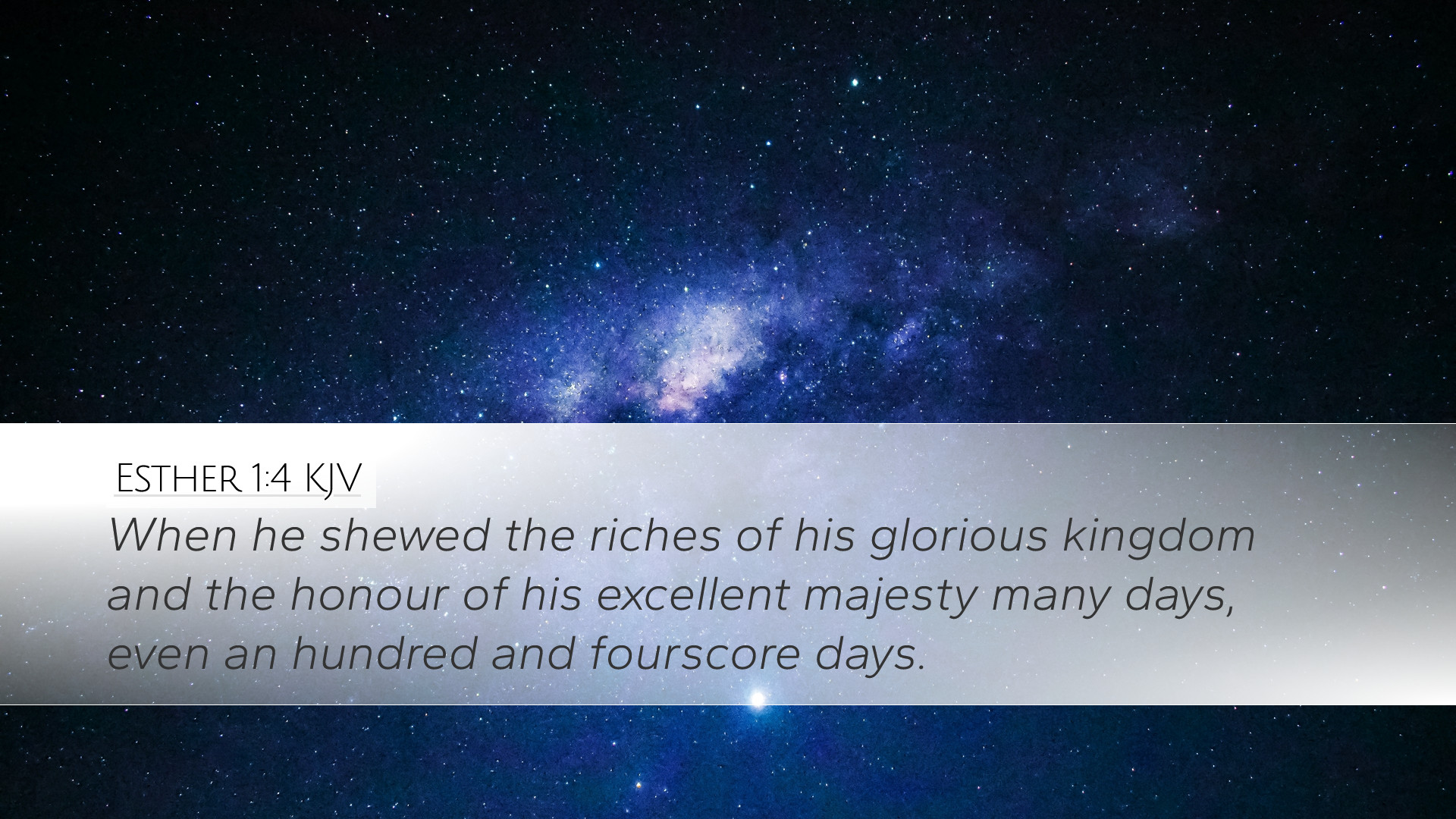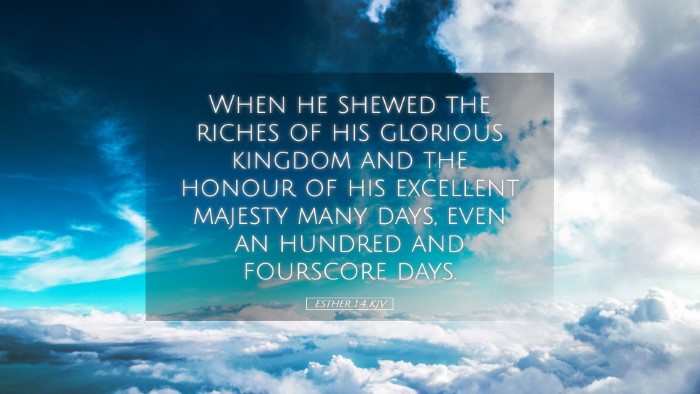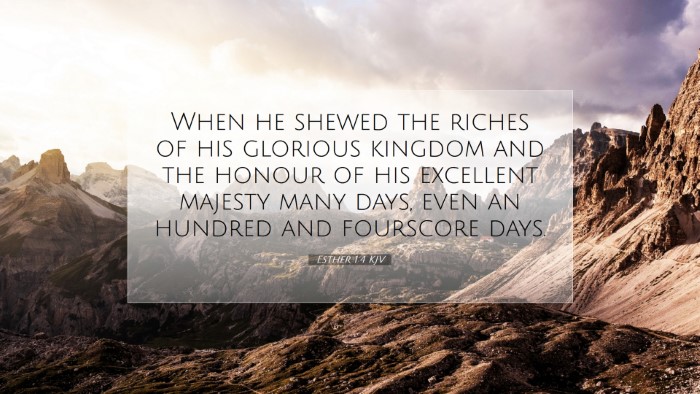Old Testament
Genesis Exodus Leviticus Numbers Deuteronomy Joshua Judges Ruth 1 Samuel 2 Samuel 1 Kings 2 Kings 1 Chronicles 2 Chronicles Ezra Nehemiah Esther Job Psalms Proverbs Ecclesiastes Song of Solomon Isaiah Jeremiah Lamentations Ezekiel Daniel Hosea Joel Amos Obadiah Jonah Micah Nahum Habakkuk Zephaniah Haggai Zechariah MalachiEsther 1:4
Esther 1:4 KJV
When he shewed the riches of his glorious kingdom and the honour of his excellent majesty many days, even an hundred and fourscore days.
Esther 1:4 Bible Commentary
Commentary on Esther 1:4
Verse Context: Esther 1:4 states, “When he showed the riches of his glorious kingdom and the splendor of his excellent majesty for many days, even one hundred and eighty days.” This verse is situated in the Book of Esther, which unfolds the story of Jewish deliverance from adversity during the reign of King Xerxes of Persia.
Introduction
The narrative of Esther begins in a royal palace, reflecting both the power and the moral decadence of the Persian Empire. This verse sets the stage for an examination of the themes of power, excess, and the contrasting humility that will emerge later in the story.
Insights from Matthew Henry
According to Matthew Henry, this extravagant display of wealth is indicative of the nature of monarchs who often seek to impress their subjects and rivals. Henry notes that the king exhibited his riches over a prolonged banquet—a period of 180 days—which serves as a stark reminder of human vanity. He emphasizes that such displays can easily lead to moral decay:
- Human Vanity: Henry points out that the king's purpose was to instill fear and admiration among his guests, showcasing the futility of pride. In human ambition, one must remain aware that the riches of this world are temporary.
- Preparatory Context: Henry posits that the king's gesture is not merely for self-aggrandizement but a preliminary move to solidify power before a significant feast, setting a preview for the ensuing events where Esther will rise to prominence.
Insights from Albert Barnes
Albert Barnes expands on the nature and implications of this verse by situating it within the broader narrative of Esther. He examines the king's intentions and the cultural practices evident in this royal assembly:
- Cultural Practices: Barnes elaborates on the tradition of displaying wealth within ancient royal courts as a means of establishing supremacy and power. The feast serves as a display of authority that transcends mere enjoyment, becoming a political statement.
- Wealth and Status: Barnes warns about the temptation of wealth leading to spiritual emptiness. The king's ostentation is reflective of the societal obsession with materialism, presenting an opportunity for the faithful to disentangle from such pursuits.
- Preparation for Crisis: He notes that this display of wealth also prepares the audience for the coming vulnerability of Xerxes, demonstrating the unpredictability of fortune and the ensuing need for divine providence, as Esther's story unfolds later.
Insights from Adam Clarke
Adam Clarke delves into the specifics of the text and outlines the reasons behind the lavish display. He provides an analysis that includes historical and theological reflections:
- Historical Context: Clarke notes that the 180 days were not arbitrary but rather typical of royal showcases in ancient Persia, designed to impress diplomats and local leaders, thereby consolidating alliances.
- Theological Reflection: He remarks that such a demonstration of earthly wealth contrasts sharply with the spiritual riches found in a relationship with God. Clarke encourages believers to seek the treasures that endure beyond earthly displays.
- Contrast in Characters: Clarke anticipates the later development of characters within the narrative, particularly Esther’s humility juxtaposed against the king’s arrogance. This establishes a theological motif that runs throughout the Scriptures regarding the exaltation of the humble.
Thematic Reflections
As we consider this verse, several key themes emerge that hold significant relevance for theology, personal reflection, and pastoral teaching.
- The Illusion of Power: The display of wealth serves as a poignant reminder that earthly power is often built on fragile foundations. In ministry, leaders are called to reflect on their reliance on and representation of Christ rather than earthly accolades.
- Challenges of Materialism: This verse illustrates the challenge of materialism that permeates not only ancient cultures but contemporary societies as well. Believers must constantly examine their attachments to wealth and status.
- The Role of Providence: God's providential hand is evident as the story unfolds, reminding us that even amidst human extravagance, He orchestrates events for His divine purpose. Pastors can draw from this theme to encourage dependence on spiritual over material wealth.
Conclusion
In Esther 1:4, we encounter a narrative that speaks volumes about human nature, the fleeting nature of wealth, and the divine plan that ultimately supersedes human ambition. The commentaries from Matthew Henry, Albert Barnes, and Adam Clarke provide a rich tapestry of insights that encourage believers and leaders alike to seek wisdom in humility and trust in God's providence, especially when faced with the allure of this world's riches.


